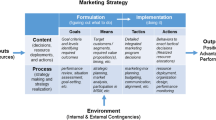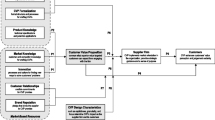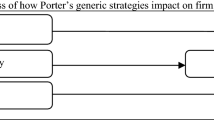Abstract
Recent studies have demonstrated effects of learning orientation or market orientation on innovation-driven organizational performance. While these studies have enhanced our understanding of innovation processes in the firm, they have been unable to determine the relative contribution of learning orientation and market orientation to innovation. The integration of these two fundamental strategic orientations in this research enables such an assessment. The model in this research also measures the degree to which market orientation and learning orientation influence organizational performance, independent of their effect on product innovation. The most notable finding is the potential preeminence of learning orientation over market orientation. The implications are of critical importance to marketers because they provide insights into the type of organizational culture that is associated with high levels of performance.
Similar content being viewed by others
References
Anderson, James C. (1987), “An Approach for Confirmatory Measurement and Structural Equation Modeling of Organizational Properties,” Management Science, Vol. 33, April, pp. 525–541.
Argyris, Chris, and Schön, Donald A. (1978), Organizational Learning: A Theory of Action Perspective, Reading, MA: Addison-Wesley.
Armstrong, J. Scott, and Overton, Terry S. (1977), “Estimating Nonresponse Bias in Mail Surveys,” Journal of Marketing Research, Vol. 14, August, pp. 396–402.
Bagozzi, Richard P., and Phillips, Lynn W. (1982), “Representing and Testing Organizational Theories: A Holistic Construal,” Administrative Science Quarterly, Vol. 27, September, pp. 459–89.
Baker, William E., and Sinkula, James M. (1999a), “The Synergistic Effect of Market Orientation and Learning Orientation On Organizational Performance,” Journal of the Academy of Marketing Science, Vol. 27, Fall, pp. 411–27.
Baker, William E., and Sinkula, James M. (1999b), “Market Orientation, Learning Orientation and Product Innovation: A Journey Inside the Organization's Black Box,” University of Vermont, Working Paper.
Churchill, Gilbert A., Jr. (1979), “A Paradigm for Developing Better Measures of Marketing Constructs,” Journal of Marketing Research, Vol. 16, February, pp. 64–73.
Day, George S. (1991), Learning About Markets, Marketing Science Institute Report Number 91-117, Marketing Science Institute, Cambridge, MA.
—————(1994a), “Continuous Learning About Markets,” California Management Review, Vol. 36, Summer, pp. 9–31.
—————(1994b), “The Capabilities of Market-Driven Organizations,” Journal of Marketing, Vol. 58, October, pp. 37–52.
Diamantopoulos, A., and Hart, S. (1993), “Linking Market Orientation to Company Performance: Preliminary Work on Kohli and Jaworski's Framework,” Journal of Strategic Marketing, Vol. 1, pp. 93–122.
Dickson, Peter R. (1996), “The Static and Dynamic Mechanics of Competition: A Comment on Hunt and Morgan's Comparative Advantage Theory,” Journal of Marketing, Vol. 60, October, pp. 102–6.
Gatignon, Hubert, and Xuereb, Jean-Marc (1997), “Strategic Orientation of the Firm and New Product Performance,” Journal of Marketing Research, Vol. 34, February, pp. 77–90.
Gerbing, David W., and Anderson, James C. (1988), “An Updated Paradigm for Scale Development Incorporating Unidimensionality and Its Assessment,” Journal of Marketing Research, Vol. 25, May, pp. 186–192.
Greenley, Gordon E. (1995), “Market Orientation and Company Performance: Empirical Evidence from UK Companies,” British Journal of Management, Vol. 6, March, pp. 1–13.
Han, Jin K., Kim, Namwoon, and Srivastava, Rajendra K. (1998), “Market Orientation and Organizational Performance: Is Innovation the Missing Link?” Journal of Marketing, Vol. 62, October, pp. 30–45.
Hult, G. Tomas M., and Ferrell, O. C. (1997a), “Global Organizational Learning Capacity in Purchasing: Construct and Measurement,” Journal of Business Research, Vol. 40, No. 2, pp. 97–112.
Hult, G. Tomas M., and Ferrell, O. C. (1997b), “A Global Learning Organization Structure and Market Information Processing,” Journal of Business Research, Vol. 40, No. 2, pp. 155–166.
Hunt, Shelby D., and Morgan, Robert M. (1996), “The Resource-Advantage Theory of Competition: Dynamics, Path Dependencies, and Evolutionary Dimensions,” Journal of Marketing, Vol. 60, October, pp. 107–114.
Hurley, Robert F., and Hult, G. Thomas (1998), “Innovation, Market Orientation and Organizational Learning: An Integration and Empirical Examination,” Journal of Marketing, Vol. 62, July, pp. 42–54.
Jaworski, Bernard J., and Kohli, Ajay K. (1993), “Market Orientation: Antecedents and Consequences,” Journal of Marketing, Vol. 57, July, pp. 53–70.
Kohli, Ajay K., and Jaworski, Bernard J. (1990), “Market Orientation: The Construct, Research Propositions, and Managerial Implications,” Journal of Marketing, Vol. 54, April, pp. 1–18.
—————, Jaworski, Bernard J., and Kumar, Ajith (1993), “MARKOR: A Measure of Market Orientation,” Journal of Marketing Research, Vol. 30, November, pp. 467–77.
McKee, Daryl (1992), “An Organizational Learning Approach to Product Innovation,” Journal of Product Innovation Management, Vol. 9, September, pp. 232–45.
Narver, John C., and Slater, Stanley F. (1990), “The Effect of a Market Orientation on Business Profitability,” Journal of Marketing, Vol. 54, October, pp. 20–35.
Rao, Vithala R. (1997), “Resources for Research and Pedagogy on New Product Development Processes,” Journal of Marketing Research, Vol. 34, February, pp. 185–92.
Robertson, Thomas S. (1971), Innovative Behavior and Communication, New York, NY: Holt Rinehart Winston.
Rogers, Everett M. (1983), Diffusion of Innovations, New York, NY: The Free Press of Glencoe.
Sinkula, James M. (1994), “Market Information Processing and Organizational Learning,” Journal of Marketing, Vol. 58, January, pp. 35–45.
—————, Baker, William, and Noordewier, Thomas G. (1997), “A Framework for Market-Based Organizational Learning: Linking Values, Knowledge and Behavior,” Journal of the Academy of Marketing Science, Vol. 25, Fall, pp. 305–318.
Slater, Stanley F., and Narver, John C. (1994), “Does Competitive Environment Moderate the Market Orientation-Performance Relationship?” Journal of Marketing, Vol. 58, January, pp. 46–55.
—————(1995), “Market Orientation and the Learning Organization,” Journal of Marketing, Vol. 59, July, pp. 63–74.
Walker, Orville C., and Ruekert, Robert W. (1987), “Marketing's Role in the Implementation of Business Strategies: A Critical Review and Conceptual Framework,” Journal of Marketing, Vol. 51, July, pp. 15–33.
Wind, Jerry, and Majakan, Vijay (1997), “Issues and Opportunities in New Product Development: An Introduction to the Special Issue,” Journal of Marketing Research, Vol. 34, February, pp. 1–12.
Workman, John P., Jr. (1993), “Marketing's Limited Role in New Product Development in One Computer Systems Firm,” Journal of Marketing Research, Vol. 30, November, pp. 405–21.
Author information
Authors and Affiliations
Rights and permissions
About this article
Cite this article
Baker, W.E., Sinkula, J.M. Learning Orientation, Market Orientation, and Innovation: Integrating and Extending Models of Organizational Performance. Journal of Market-Focused Management 4, 295–308 (1999). https://doi.org/10.1023/A:1009830402395
Issue Date:
DOI: https://doi.org/10.1023/A:1009830402395




